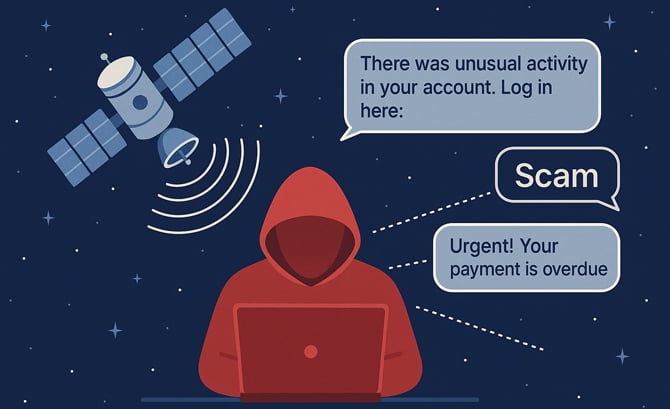If you’ve been getting more scam texts, calls, or emails lately, the source may be farther away than you think. It’s half a world away in Southeast Asia, powered by SpaceX’s Starlink satellite internet service.
Senator Maggie Hassan (D-NH) is urging SpaceX CEO Elon Musk to block transnational criminal networks from using Starlink satellite internet service to run “scam compounds” that defraud Americans out of billions of dollars. In a letter this week, she called out Starlink for “apparently continuing to permit access” despite service rules that already allow it to terminate fraudulent activity.

How Starlink is fueling scam operations
These scams trace back to organized criminal groups operating across Myanmar, Thailand, Cambodia, and Laos, according to U.S. and U.N. reports. Many of these operations run from remote compounds where trafficked workers are forced to perpetrate phishing, “pig butchering” investment scams, and romance fraud schemes.
Read more: The Hidden World of Cyber-Scam Slave Labor Factories
Local governments have attempted to shut down these hubs by cutting off electricity and internet access – Thailand even halted power and fuel deliveries to border towns earlier this year. But Starlink’s satellite-based connectivity bypasses terrestrial infrastructure entirely, keeping these operations online despite regional crackdowns.
Hassan argues SpaceX has a responsibility to police its network more aggressively: “Scam networks… have apparently continued to use Starlink despite service rules permitting SpaceX to terminate access for fraudulent activity.”
What SpaceX could do, and why it’s complicated
Starlink could take several steps to combat abuse on its network. It could terminate accounts tied to scam activity by using fraud detection tools and acting on information provided by law enforcement. The company could also restrict service in areas known for hosting scam hubs. And, Starlink could implement stricter identity verification requirements for new accounts in countries with weak regulatory oversight, making it harder for criminal groups to sign up for service anonymously.
But cutting off access to scam hubs isn’t simple. Starlink also serves rural communities and humanitarian missions in these regions, so aggressive measures risk collateral damage. And unlike U.S.-based wireless carriers, which the FCC tightly regulates, Starlink operates globally across multiple jurisdictions, making enforcement more complicated.
How Starlink-transmitted scams reach Americans
Once fraud traffic reaches U.S. networks – whether by email, text, or spoofed VoIP calls – its origin is effectively masked. You can’t see (or block) whether a scammer is connected via Starlink. Instead, these scams are filtered – or missed – by carrier-level tools and email providers.
Bottom line: Satellite internet has become an unexpected lifeline for cybercriminals operating out of hard-to-reach regions. Hassan’s push raises a new question: Can SpaceX be held accountable directly for policing fraud on a global scale? Or does the FCC need to step in and establish rules for carriers with SMS, as it did with STIR/SHAKEN for voice calls?
[Image credit: Illustration created by ChatGPT using DALL-E]















